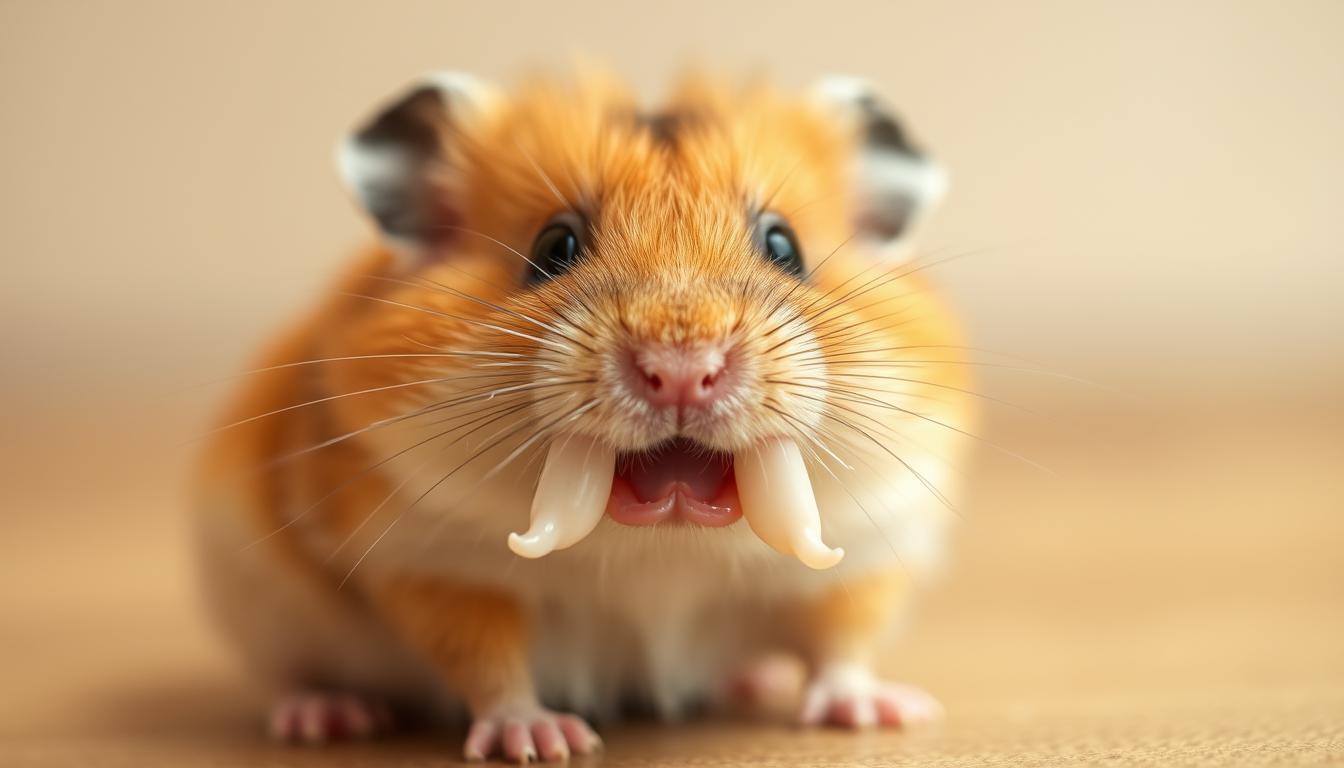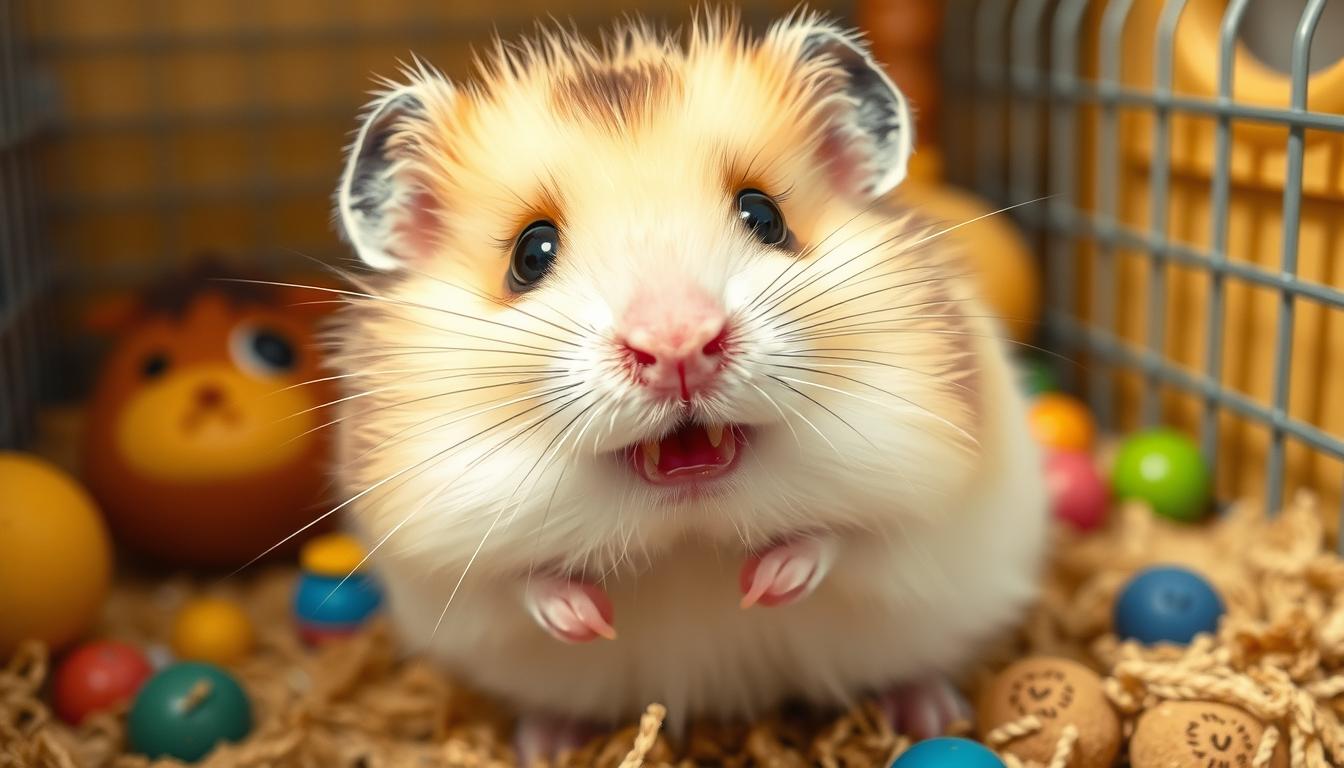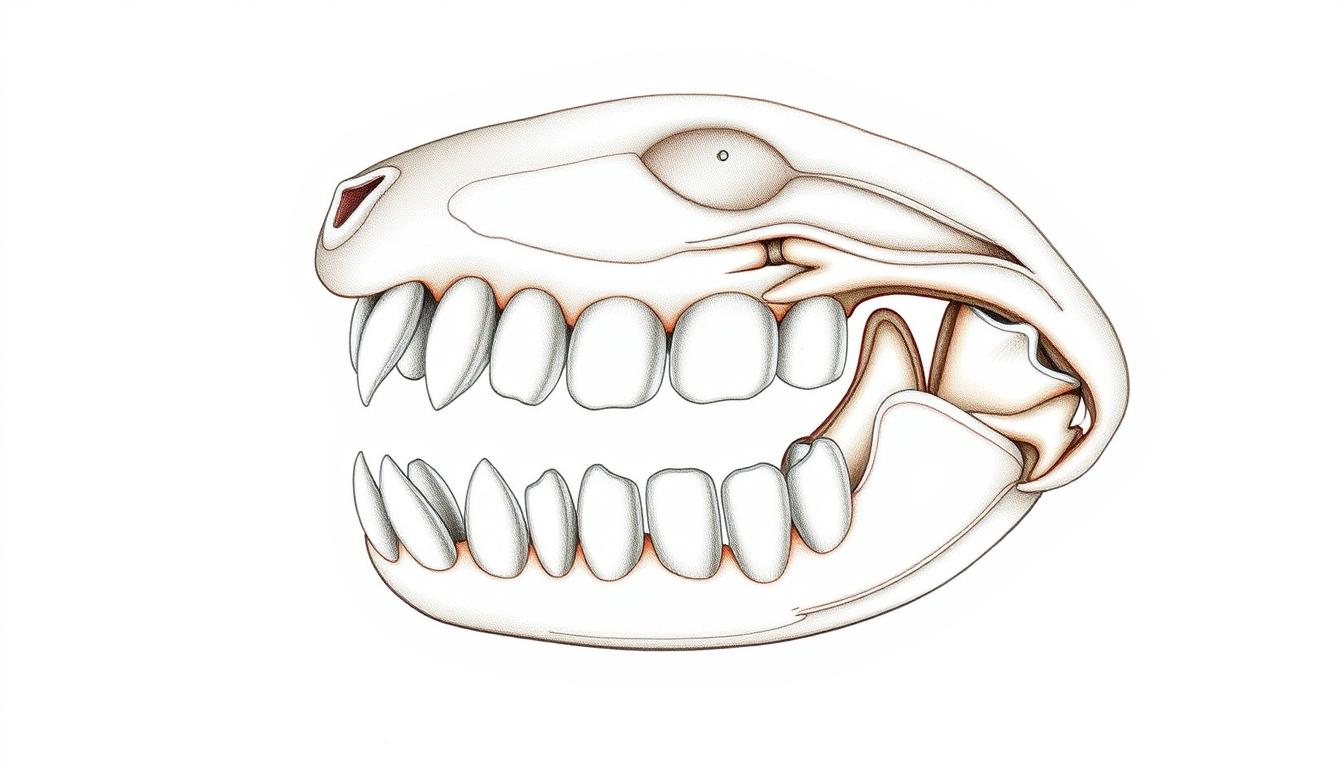Do you know how important your Syrian hamster’s teeth are for their health? These small animals have special teeth that need careful attention. But what makes their teeth different, and how can you keep their mouth healthy? Let’s explore how to take care of your hamster’s teeth and keep their smile bright.
Key Takeaways
- Syrian hamsters have continuously growing front teeth (incisors) that need to be worn down through regular chewing
- Overgrown incisors can lead to various dental problems, including difficulty eating and potential tooth root abscesses
- Providing your hamster with appropriate chew toys and a balanced diet is crucial for maintaining their oral health
- Regular monitoring and veterinary check-ups are essential to catch any dental issues early on
- Understanding the natural wear and growth patterns of hamster teeth can help you identify and address any concerning signs
The Basics of Syrian Hamster Teeth
Learning about your Syrian hamster’s teeth is important for their health. These small animals have teeth that help them eat and stay healthy. By knowing about Syrian hamster teeth anatomy, you can keep their teeth in great shape.
Types of Teeth in Hamsters
Syrian hamsters have four kinds of teeth:
- Incisors: Sharp, chisel-like teeth used for gnawing and cutting.
- Premolars: Smaller teeth between incisors and molars, helping with grinding and chewing.
- Molars: Larger, flat teeth at the back for grinding food.
How Teeth Grow and Change
Syrian hamster teeth grow continuously. Unlike human teeth, hamster teeth keep growing to stay sharp. This helps them eat and chew food effectively.
Importance of Teeth for Health
Good dental care is key for your Syrian hamster’s health. Their teeth help them eat well and digest food properly. Ignoring dental care can cause problems like overgrowth and pain. By understanding rodent teeth and syrian hamster dental health, you can help your hamster live a long, happy life.
Signs of Dental Problems in Hamsters
As a hamster owner, it’s key to watch for hamster teeth problems signs. Spotting symptoms early can help your pet get the care they need. Regular dental checks are important, but knowing home signs is crucial too.
Common Symptoms to Watch For
- Difficulty eating or chewing food
- Excessive drooling or salivating
- Unexplained weight loss or poor appetite
- Visible overgrowth or misalignment of teeth
- Lethargy or decreased activity levels
If you see these signs, act fast. Malocclusion in hamsters can cause big problems if not treated.
When to Seek Veterinary Help
Some dental issues can be handled at home, but seeing a vet is best. They can diagnose and treat your hamster’s teeth problems. They’ll also tell you how to keep your hamster’s teeth healthy. If you think your hamster has hamster teeth problems, get vet help.
“Proper dental care is essential for the overall health and well-being of your Syrian hamster. Paying attention to the signs of dental issues can help you provide the best possible care for your pet.”
Proper Diet for Healthy Syrian Hamster Teeth
Keeping your Syrian hamster’s teeth healthy starts with a balanced diet. The right foods can strengthen their teeth and prevent dental problems. Let’s look at the best foods for their teeth and the snacks to avoid.
Recommended Foods for Dental Health
Crunchy fruits and vegetables are key for your hamster’s teeth. Good choices include:
- Carrots
- Apples
- Celery
- Cucumber
- Bell peppers
These foods are full of vitamins and minerals. They also help wear down your hamster’s teeth. Add high-quality hamster dental care pellets and timothy hay for extra fiber and nutrients.
Avoiding Harmful Snacks
It’s tempting to give your Syrian hamster teeth treats, but some can harm their teeth. Avoid sugary or sticky foods like:
- Cookies
- Candy
- Dried fruit
- Honey
These snacks can cause tooth decay and dental issues. Stick to crunchy, natural foods for healthy teeth wear.
By following these dietary tips, your Syrian hamster can keep their teeth strong. A balanced diet is crucial for hamster dental care.
Importance of Chew Toys for Hamsters
As a Syrian hamster owner, you know how vital dental health is. Chew toys are a great way to keep your hamster’s teeth healthy. They let your pet gnaw naturally, which is good for their teeth and gums.
Best Chew Toy Options
There are many chew toys for Syrian hamsters. Some top picks include:
- Wooden blocks or sticks
- Cardboard tubes and boxes
- Untreated timothy hay cubes
- Corn husks or paper-based chew toys
- Mineral or salt-based chew stones
How Chew Toys Help Maintain Teeth
Chewing is key for Syrian hamsters. It keeps their teeth from growing too long. Chewing on toys also strengthens their jaw and improves dental health.
| Chew Toy | Benefits |
|---|---|
| Wooden blocks or sticks | Provide a natural, abrasive surface to wear down teeth |
| Cardboard tubes and boxes | Satisfy the urge to chew and shred while being safe and digestible |
| Untreated timothy hay cubes | Offer a fibrous, crunchy texture that helps grind down teeth |
Adding different hamster chew toys to your Syrian hamster’s space is good for their syrian hamster dental health. It supports their natural dental care.
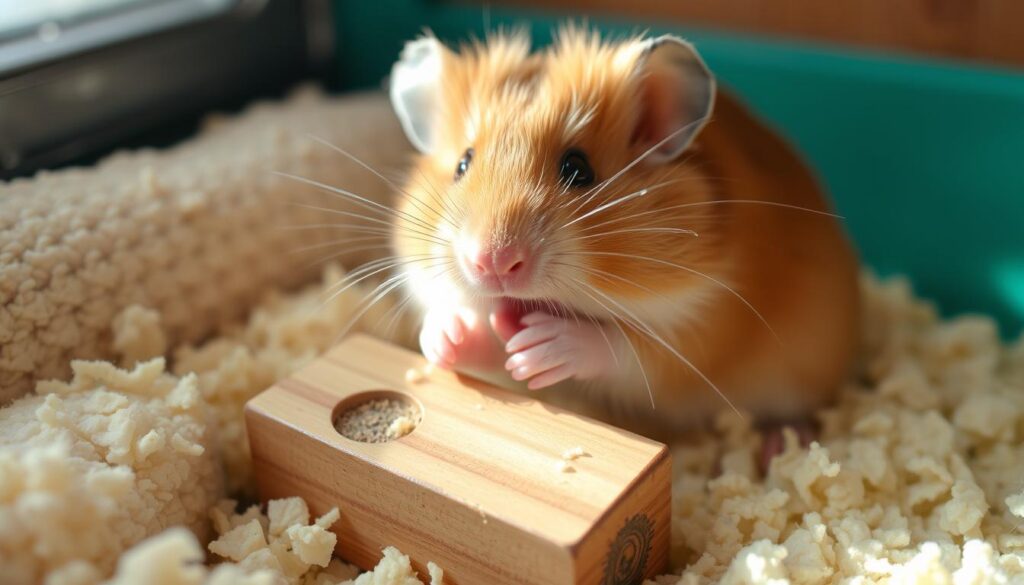
How to Maintain Your Hamster’s Dental Hygiene
Keeping your Syrian hamster’s teeth clean is key to their health. Regular checks and encouraging chewing are important. This helps keep their teeth strong and healthy.
Routine Checks You Should Perform
As a hamster owner, you should check their teeth often. Open your hamster’s mouth gently and look at their teeth. Watch for any color changes, growth, or odd shapes. If you see problems, see a vet right away.
Techniques for Encouraging Chewing
Chewing is vital for Syrian hamsters to keep their teeth in good shape. Give them chew toys that are safe and durable. Wooden blocks, hay cubes, and untreated toilet paper rolls are great options for hamster dental care.
| Chew Toy | Benefits |
|---|---|
| Wooden Blocks | Helps wear down teeth and satisfies the natural chewing instinct |
| Hay Cubes | Provides fiber and encourages chewing behavior |
| Toilet Paper Rolls | Affordable, safe, and promotes healthy chewing habits |
Good dental care and regular checks are crucial for your Syrian hamster’s teeth. By following these tips, you can keep your hamster’s teeth clean and their smile bright.
Understanding the Natural Wear of Hamster Teeth
As rodent teeth, Syrian hamsters’ teeth grow and wear down naturally. This process is key for their dental health and function. Knowing what affects tooth growth and wear can help keep your Syrian hamster’s teeth healthy.
How Teeth Naturally Wear Down
Syrian hamsters’ teeth have hard enamel and a softer inner layer. Chewing on different surfaces wears down the enamel, keeping teeth the right length. The grinding action of chewing files down the teeth, preventing them from getting too long.
Factors Affecting Tooth Growth
Several factors can change how fast Syrian hamsters’ teeth grow. These include:
- Diet – Eating fibrous, hard foods makes them chew more, wearing down teeth naturally.
- Genetics – Some hamsters grow teeth faster or slower, needing more or less care.
- Environment – Having the right chewing surfaces and exercise can affect tooth wear.
Knowing these factors helps you support your Syrian hamster’s teeth and keep them healthy.
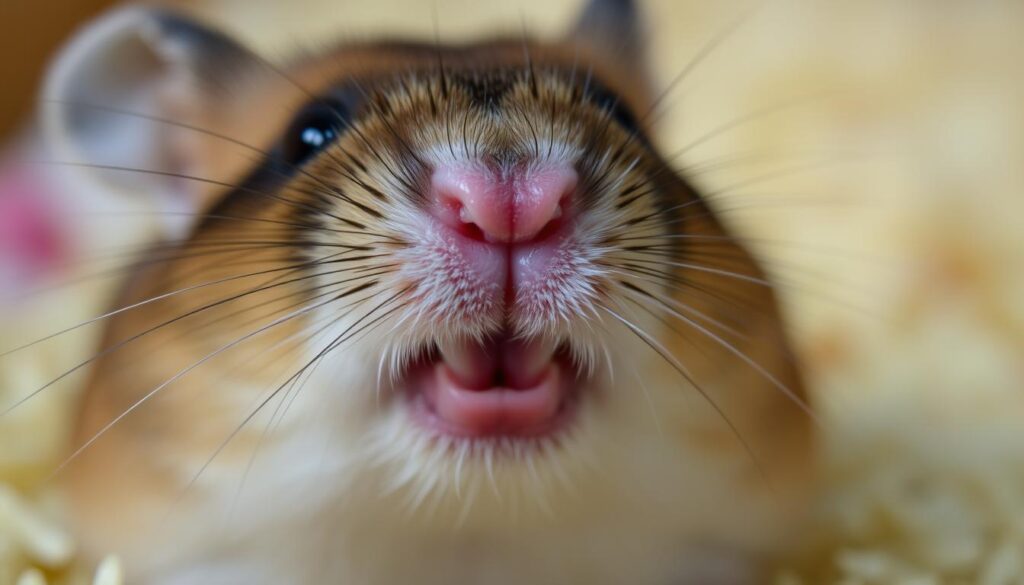
“Proper dental care is essential for the overall well-being of your Syrian hamster. By addressing factors that affect tooth growth, you can help ensure your furry friend enjoys a happy, healthy life.”
How to Identify Overgrown Teeth
Overgrown teeth are a common issue for Syrian hamsters. It’s important to spot the signs early to get vet care and avoid serious problems. Let’s look at how to tell if your hamster’s teeth are too long.
Signs of Overgrowth in Syrian Hamsters
One clear sign is when your hamster can’t close its mouth. Their teeth might stick out, giving them a buck-toothed look. You might also see them having trouble chewing or eating because their teeth are too long.
Another sign is a lot of drooling or saliva. This happens when the teeth hurt the gums or tongue. Your hamster might shake its head or rub its face on things to feel better.
Potential Health Implications
Long hamster teeth problems can hurt your pet’s health. If not treated, they can cause pain, eating troubles, and harm to mouth tissues. In bad cases, the teeth might even grow into the cheeks or eyes, risking infection.
Not being able to grind teeth can also lead to dental issues. This makes eating harder and can hurt the hamster’s mouth health.
Spotting and treating overgrown hamster teeth early is key. By acting fast, you can keep your Syrian hamster healthy and avoid worse dental problems.
Solutions for Managing Dental Issues
As a responsible Syrian hamster owner, it’s crucial to address any dental problems your furry friend may face. Fortunately, there are both professional treatment options and effective home remedies you can explore to keep your hamster’s teeth healthy and well-maintained.
Common Treatment Options
If your hamster’s teeth have become severely overgrown or misaligned, a veterinary dental procedure may be necessary. Teeth trimming, or hamster teeth trimming, is a common solution that involves carefully filing down the overgrown teeth to restore their proper shape and functionality. This procedure is typically performed under anesthesia to ensure your hamster’s comfort and safety.
In some cases, your veterinarian may recommend tooth extraction if the teeth have become too problematic. This is a more invasive option, but it can provide relief for your syrian hamster dental health and prevent further complications.
Home Remedies You Can Try
Before resorting to professional treatment, there are several home remedies you can try to manage your hamster’s dental health:
- Provide a variety of chew toys, such as wooden blocks, hay cubes, and untreated cardboard, to encourage natural teeth-wearing.
- Offer a diet rich in high-fiber foods, like hay and fresh vegetables, to help wear down your hamster’s teeth.
- Regularly check your hamster’s teeth and gums for any signs of overgrowth or infection, and seek veterinary attention if necessary.
By combining professional care and proactive home management, you can ensure your Syrian hamster maintains healthy, well-functioning teeth for a long and happy life.
The Role of Exercise in Dental Health
Keeping your Syrian hamster’s teeth healthy is more than just food and chew toys. Exercise is also key for their dental health and overall well-being. Learn how exercise helps your hamster’s teeth and find fun activities for their daily routine.
Benefits of Physical Activity
Regular exercise keeps your Syrian hamster fit and healthy. It also helps their teeth and gums stay in top shape. Exercise stimulates chewing, which wears down their teeth as they grow.
It also boosts circulation, strengthens jaw muscles, and keeps their mouth healthy. This is all part of their overall health.
Recommended Activities for Your Hamster
- Provide a large, multi-level exercise wheel that encourages your hamster to run and climb.
- Offer a variety of chew toys, including wooden blocks, untreated branches, and safe, edible items that promote natural chewing.
- Create an enriched environment with tunnels, hides, and ramps that allow your hamster to explore and stay active.
- Set aside time for supervised playtime outside their enclosure, ensuring they have ample space to scurry and burrow.
Adding these fun activities to your hamster’s daily life helps keep their syrian hamster teeth healthy. A balanced diet, chew toys, and exercise are essential for strong, healthy teeth.
Frequently Asked Questions About Syrian Hamster Teeth
Are you new to Syrian hamsters and worried about their teeth? We’ve got answers for you. From teeth grinding to how to care for them, we’ve got expert tips. These will help keep your hamster’s teeth healthy and strong.
Common Concerns Hamster Owners Have
Many owners worry about teeth grinding, or bruxism. It’s normal for Syrian hamsters and keeps their teeth in shape. But, if your hamster grinds too much, it might mean there’s a problem.
Another worry is what to feed them for good dental health. Hamsters need a diet with hay, quality pellets, and fresh veggies. This helps their teeth stay strong.
Expert Tips for New Owners
Our experts suggest regular checks for your hamster’s teeth. Open their mouth gently to see their teeth. This helps catch any problems early.
Also, give your hamster safe chew toys. This helps wear down their teeth and keeps them healthy. By following these tips, your Syrian hamster will have a happy, healthy smile for life.


